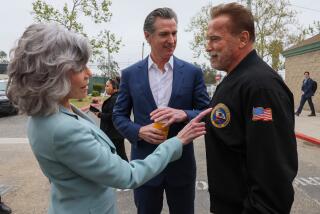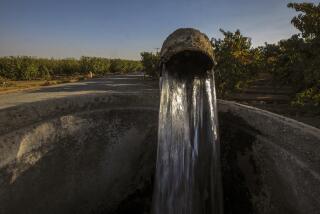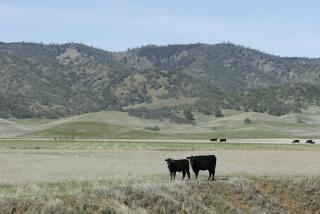Time is running out for sensible action on fracking regulations
SACRAMENTO—California may be on the brink of another great oil boom. It consequently could be heading into an environmental disaster.
A state senator from Agoura Hills is trying to allow the first while heading off the second.
Democrat Fran Pavley’s oil fracking regulation bill is one of the most significant and controversial that the Legislature is fighting over in the final days of its 2013 session, scheduled to adjourn Sept. 13.
Unless you have been buried 10,000 feet underground with all that untapped oil, you’ve probably read about fracking, formally known as hydraulic fracturing. It’s a drilling technique that uses a high-pressure mixture of water, sand and chemicals to loosen oil deep underground.
There’s a related procedure called acidizing, which involves injecting acid into oil shale.
Mix the topics of oil, water, toxic chemicals and acid together and you get a volatile political brew.
The petroleum industry is anxious to expand fracking and acidizing into the Monterey Shale Formation of Central California in hopes of extracting an estimated 15.4 billion barrels of oil.
But there’s much fear about these operations polluting underground water and even reducing aquifer sizes because of the large volume of water needed to drill.
Pavley’s regulation bill, SB 4, is on the Assembly floor awaiting a vote. If passed by a simple majority, the measure would return to the Senate for concurrence in Assembly amendments. It originally passed the Senate in late May on a party-line 28-11 vote—all Democrats for, all Republicans against.
The measure is opposed by the oil industry, which considers it regulatory overkill. It’s also opposed by some environmental groups, including the Sierra Club, who regard it as too soft.
Pavley, whose environmental credentials are beyond dispute, believes her bill is all that’s politically practical. “I’m trying to be in year 11 [as a legislator] a little bit pragmatic,” she says. “The worst case scenario is to do nothing.”
Moderate U.S. Sen. Dianne Feinstein (D-Calif.) added her support Wednesday in a letter to Assembly Speaker John A. Pérez (D-Los Angeles).
“Unless the potential dangers of fracking are addressed,” Feinstein warned, “we face the possibility of catastrophic consequences to the state’s environment and precious groundwater.”
Gov. Jerry Brown doesn’t have a position on the bill. He seems to consider it a nuisance.
“The governor told me, ‘I’m very busy with so many things right now,’ ” Pavley said. Mainly, Brown is focused on prison crowding.
Asked about oil fracking by reporters in May, Brown’s response reflected, ambiguously, both sides. “This is not about just saying, ideologically, ‘yea’ or ‘nay,’ ” the governor replied.
“It’s about looking at what could be a fabulous [economic] opportunity. But we want to make sure about the aquifers. Some people are talking about earthquakes, a lot of things. What are the chemicals? What do we know? And, in addition, climate change is real.
“Now, the reason why I have some sympathy for oil drilling in California is because 98% of the people are using oil that is imported. And until we get them in electric cars or walking or riding on bikes, we need oil. But we’ve got to get off it. Climate change is very real.”
Brown has ordered the state Division of Oil, Gas and Geothermal Resources to develop its own regulations, but they would be superseded by legislation—if the governor signed it.
It’s not clear whether Brown would be willing to let the Legislature take the lead or insist on his administration writing the rules—that is, after he frees up time to focus on the issue.
Unlike its other environmental regulations, California’s on fracking and acidizing are among the weakest in the nation. Even Texas is tougher on fracking.
Pavley’s bill would require permits for fracking and acidizing, in new wells and old. It would force oil companies to reveal the chemicals they use. There’d be independent monitoring of water and air quality.
Several bills—including Pavley’s original—would have declared a moratorium on fracking. But the oil industry beat that back.
“I could count the votes, and there weren’t enough to move the bill forward,” the senator says. “I want to make sure we at least have minimal monitoring.”
Currently, she says, the state “can’t tell you where wells are being fracked, what kinds of chemicals are being used and where the waste fluids are stored. That’s alarming.”
The oil industry says there’s no evidence of groundwater being polluted by fracking. That may be true. But no one has looked very hard for the pollution, either.
“There’s a lot of money at stake,” Pavley notes. “We’ve got all this technology that wasn’t around years ago. With $4 gasoline, the economics and technology have come together to make this the second Gold Rush.”
Cracking into Monterey Shale oil could create between 500,000 and 3 million jobs, the Western States Petroleum Assn. estimates, generating many billions of dollars in revenue for state and local governments.
Those governments certainly could use the money—for public works, paying off debt and educating children.
And it’s hypocritical to demagogue against “big oil” when we all use it, importing 40% from foreign countries.
California should produce all the oil it safely can, but with the emphasis on safe.
Pavley’s bill is a reasonable, middle-course solution.
More to Read
Start your day right
Sign up for Essential California for news, features and recommendations from the L.A. Times and beyond in your inbox six days a week.
You may occasionally receive promotional content from the Los Angeles Times.







